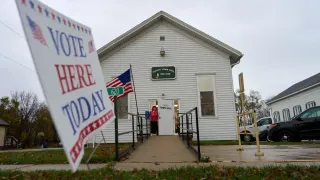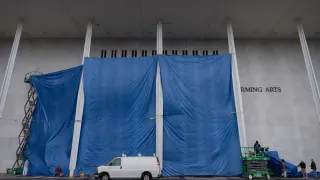December 6, 2017
Describe the Night
Brooke Pierce READ TIME: 3 MIN.
In his intimate yet sprawling new play "Describe the Night," now playing Off-Broadway in a production by the Atlantic Theater Company, Rajiv Joseph has taken some pieces of Russian history (both recent and not-so-recent) and spun them into a narrative tapestry that spans almost 100 years.
Jumping around in time, the play begins in 1920 in Poland, where Russian Red Army members Isaac Babel, a budding writer, and Nikolai Yezhov, a sort of jovial thug, meet and develop an unlikely friendship. We encounter the pair again years later as Babel has found success as a writer and Yezhov has risen through the ranks to become an influential military leader in Stalin's brutal regime. Babel meets Yezhov's wife Yevgenia and the two begin an affair.
Yezhov and Yevgenia resurface again, separately, many years later, in the 1980s. She is an old woman living in Dresden with her granddaughter, Urzula, who dreams of escaping to the West. He is an old man working in a bureau of the government managing stacks of confidential files, and he hires an ambitious agent named Vova to surveil Urzula and prevent her from fleeing.
The play also leaps further forward to 2010 in Smolensk, where a reporter seeks refuge in a car rental place in the immediate aftermath of a plane crash that wipes out the top level of the Polish government and military in one fell swoop. The reporter is terrified that her very occupation will make her subject to arrest by media-wary Russian officials who think she will try to blame them for the crash.
Playwright Joseph weaves all of these strands together expertly, introducing unexpected connections along the way. Babel, Yezhov, and Yevgenia are all historical figures, and what we learn about them during their earlier years is largely based in fact. But it seems Joseph is using his (clever and delightful) imagination in his representation of their elderly exploits. The Smolensk plane crash is also historical, and Joseph even introduces a version of Vladimir Putin into his rendering of the aftermath of this incident.
Under the sure guidance of director Giovanna Sardelli, "Describe the Night" travels back and forth through time with ease. The phenomenal cast is headed by Danny Burstein as the charming wordsmith Babel, Zach Grenier embodying both the ridiculous and the dangerous in Yezhov, and Tina Benko as the spirited survivor Yevgenia. They turn these little-remembered historical individuals into bold characters, fully embracing Joseph's vibrant, funny, and somewhat off-kilter universe.
While I won't presume to guess the playwright's intentions in writing "Describe the Night," he has managed to pen a work that hits on numerous 'of the moment' political themes-suspicion of the media, authoritarianism, the role and value of journalists, questions around truth and facts, and even Russian spying -- without feeling heavy-handed in the least. If anything, the play is a reminder that these issues are not new and that people have had to navigate them before.
There are moments when the play makes one think of the challenges our country is facing right now, moments when it seems to offer some reassurance, and moments when it feels like a warning. But, mostly, "Describe the Night" is a partly true and totally engaging tale that would hopefully make Isaac Babel himself proud.
"Describe the Night" runs through December 24 at the Atlantic Theater Company, Linda Gross Theater, 336 West 20th Street, NYC. For information or tickets, call 866-811-4111 or visit www.atlantictheater.org






